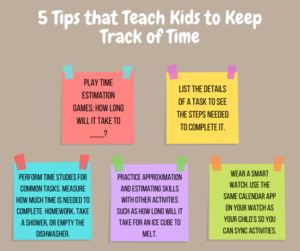It is not uncommon for children to lose track of time, especially in a world with so many distractions. Losing track of time can look like always being late, being the last one to leave the house for school, daydreaming, and more. Sometimes children seem to lose track of time simply because they are slow to take in the world around them. This could be a result of slow processing speed or inattention; both of which make it easier for someone to lose track of time. A common example of this is when homework has to be completed or it is time for bed, but the child becomes so engaged in another activity that they forget or seem to ignore their homework or bedtime. Oftentimes this is a result of a complete lack of awareness that time has passed, and many children require assistance in learning how to be aware of the passage of time (especially when they are engaged in something they are interested in).
Some kids really struggle with keeping track of time, and one of the things that might be happening is they could be struggling with their use of executive functions. Executive functioning skills are one of the things that we examine when we work with children at South County Child and Family Consultants. At SCCFC we perform neuropsychological evaluations on children to better understand the way their brain works and why they are the way that they are. It’s not uncommon to have problems with executive functioning, as it is a common symptom of ADHD and it is even seen in children with Autism Spectrum Disorder. If you are interested in a neuropsychological evaluation with us to better learn about your child, please contact us below.
Here are five tips to teach a child to keep track of time:
1. Playtime estimation games: how long will it take to…?
Throughout the day, randomly ask your child to estimate how long it will take you to get home from school, how long it will take to cook dinner in the oven, or how many hours until it is time for bed. As long as you have a close estimate of those times before you ask, helping the child to associate an amount of time with something they are familiar with will aid them in the understanding of time and how time passes. Other ways to use this task is to time your child doing tasks and ask them about how long they have been doing that task for, or tell them they have a certain amount of time (ex. 10 minutes) to finish a task. All of these activities allow the child to engage with time and become more cognizant of time and its passage as it relates to them and their life.
2. List the details of a task to see the steps needed to complete it.
Sometimes children have trouble understanding how many steps a task will take, and this can impact their understanding of the passage of time. By encouraging the child to think about what steps they will need to take to complete the task, the child may be able to estimate time more effectively. An example of this would homework completion. Homework requires the child to grab their backpack, organize the contents so they can find their homework papers and the materials they need to complete it, then they must complete each assignment, take the time to check their work, and finally clean up their workspace and put their assignments away. If the child is not considering all of the steps to completing their homework, this may be impacting their estimation of time. In addition, timing each step and telling the child how long it took them will aid in this process. Doing this on a consistent basis with all kinds of different tasks will be important.
3. Use a daily “to-do” list that highlights special activities.
In addition to listing out all of the substeps of activities, placing a daily to-do list in a common area of the house will be useful. Create one column for each child and one for the parents, listing out everything that needs to be done in the morning before school, for example. Start small with the two or three most important tasks, like brushing teeth, getting dressed, and eating breakfast. This allows the child to prioritize these few items to ensure they will complete them before school. Once the child can appropriately complete these tasks independently before it’s time to leave for school, then more tasks can be added to the daily to-do list for them to do themselves.
4. Perform time studies for common tasks. Measure how much time is needed to complete homework, take a shower, or empty the dishwasher.
Similar to the previous suggestions, set a time limit for them to complete the chore from start to finish. After this, you can begin setting shorter time limits for the tasks. As you work towards decreasing the time limits on the tasks, it will be important to praise any efforts and attempts to complete the task more efficiently. Not only will this allow them to better understand the passage of time, decreasing the time limit will aid in their time management skills. Consistency is key with this task; doing this on a consistent basis with specific tasks is important for positive improvement and results. This is great for tasks the child enjoys, so they can recognize how much time has passed during tasks they would have otherwise done for hours without knowing.
5. Make time for breaks.
Part of time management is knowing when you need some downtime and when your brain needs some rest. Trying to force the completion of a task when your brain is not in it will take longer and produce a lower quality of work. Recognizing signs of fatigue will be important to finish tasks in a timely manner, and teaching the child how to identify these signs is important as well. If the child is having trouble identifying these signs, tracker apps, such as Be Focused, incorporate both long and short breaks into their time tracking.
If you are looking to print this document, please select “download this as a pdf” on the top of this page. If you are looking to print the image, please click on the image itself.
If you are local to Rhode Island and are looking to schedule a neuropsychological evaluation with us, please contact us below.
Receive online class information and helpful tips from Dr. Randy Kulman's LearningWorks for Kids |





